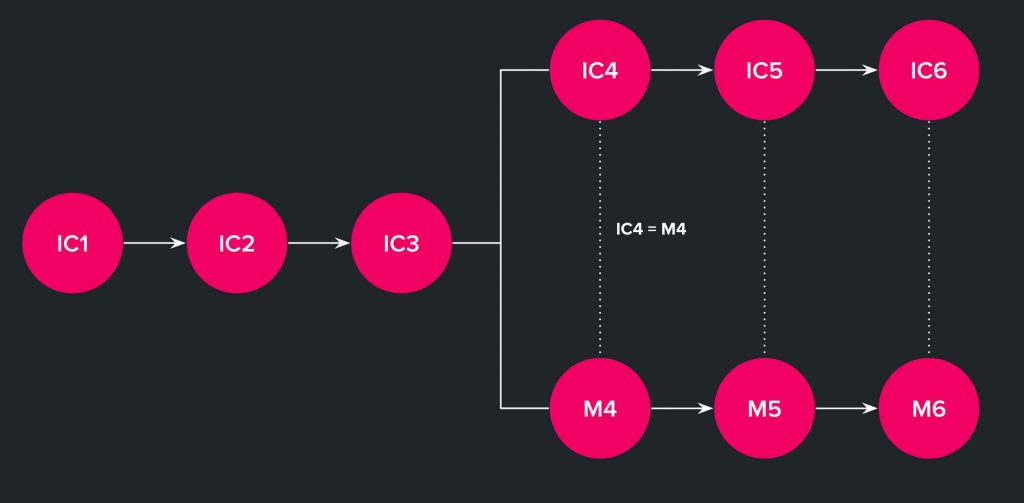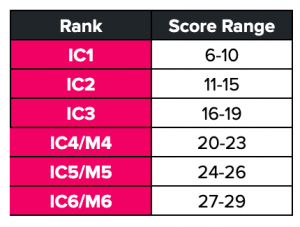Career Growth Framework
Accelerating Careers at block42
The people at block42 make the goal of shared prosperity a reality, and we want to make sure they work in the most positive environment. To achieve this goal, we are introducing the Career Growth Framework.
The Career Growth Framework outlines how anyone in the company can work towards their dream job, and illustrates exactly where a person stands in their career journey and what is expected of them before taking the next step. This approach makes the process of “laddering up” more transparent and fair for everyone. It also simplifies the promotions and compensation system by being based on tangible metrics.
The Fundamentals of the Growth Framework
The Growth Framework is constructed from 6 levels that split into two branches. The two branches signify whether or not someone wants to continue as an individual professional, or go in the direction of being a team manager. Moving through the levels is based on 6 graded factors, where each grade requirement is clearly described. The 6 factors include: Knowledge, Ownership, Communication & Leadership, Identification, and Experience.
Two-fold paths
As mentioned above, you can profile yourself based on the two branches:
- Individual Contributor (IC)
- People Management (M)
Everyone starts as an Individual Contributor (IC1, IC2, IC3). After reaching IC3, you can decide if you want to continue on the IC-path and become an Individual Professional (IC4, IC5, IC6), or you can decide to shift towards People Management (M4, M5, M6).

Generally, more promotion opportunity is available for those who decide to go the People Management route. But we recognize that not everyone wants to be responsible for a team. We value each team member regardless of the direction they choose, which is proven through how we compensate people in both professional tracts.
Why is this so important?
Imagine Natalie, an extremely skilled software engineer. Her passion is designing software architecture and coding. Her manager recognizes her talent and starts promoting her. Suddenly, she faces the challenge of leading a small team. Besides developing, she needs to attend more meetings, or hold feedback 1-on-1s. She no longer has time to code. She gets frustrated, quits her job, and moves to a new company, where she starts as a software engineer. But eventually, the entire process starts again.
We want to avoid these situations.
Graded Skills
The skills that determine one’s rank include:
Knowledge
Describes how much knowledge someone has in a certain domain, e.g. Software Development or Accounting. This encompasses what type of work is done, how complex it is, and how professionally the work is performed.
Ownership
Describes how much responsibility someone takes on, how consistent their performance is, and how appropriate someone acts. It’s also about understanding overall business & technology implications. For instance, when someone is aware of the impact a certain task or decision will have on the company goals.
Communication & Leadership
This skill describes two attributes that are closely related. Everything starts with communication. How often, clearly, and accurately someone communicates. Is there enough context provided? Is all necessary information shared with the right people?
Leadership is about taking an active part in shaping block42’s future. It’s about giving precise and useful feedback to peers, mentoring junior team members, and asking the right questions. On a higher level, it’s about actively contributing to block42’s vision and pushing the team to reach it.
Identification
block42 lives from its people who are passionate about blockchain technology and crypto. Furthermore, we need team members who are proud to be part of block42’s journey and its mission.
For this skill, you need to demonstrate a full dedication for a decentralized future and a 100% commitment to block42.
Experience
The rigorous standard in measuring someone’s career progress. But having lots of lines to fill a CV is not everything. There are novices outperforming professionals with 10+ years in the industry.
Thus, experience is not the only indicator for promotions.
Levels of the Skills
Each skill can be leveled, from Entry-level to Mastery.

The speed of leveling up usually depends on the level itself. Moving up from Entry (level 1) to Developing (level 2) is much easier and faster than moving up from the Expert (level 5) to Mastery (level 6).
Assessment of the levels
Each skill level represents a score, e.g. the skill Knowledge at level 3 equals a score of 3.
Possible ranges for each skill:
- Knowledge 1-6 IC-path, 4-6 M-path
- Ownership 1-6 IC-path, 4-6 M-path
- Communication & Leadership 1-5 IC-path, 4-5 M-path
- Identification 1-4
- Experience 1-4 (x2 Multiplier)
In the example of our brilliant engineer, she is extremely Knowledgeable in her field of activity, reaching level 4. Her Ownership is at level 3 as well as her Communication & Leadership skills. She fully Identifies with blockchain and block42 values and constantly contributes to shaping our culture, reaching level 4. She started out her professional career two years ago, reaching Experience level 2.
Summed up she reached a total score of 18 (4+3+3+4+(2*2)). Which would make her a rank of IC3.
